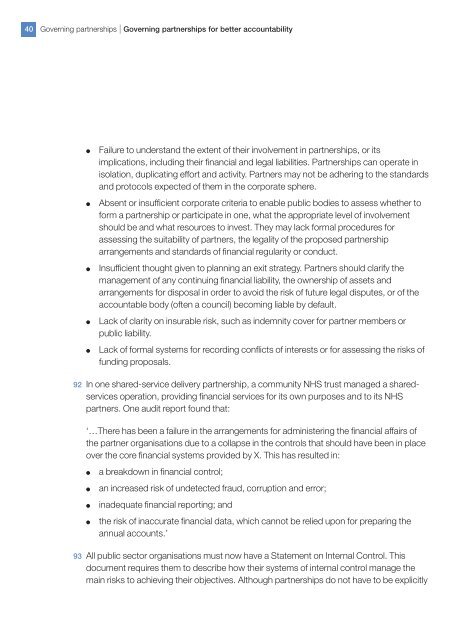Bridging the accountability gap - Audit Commission
Bridging the accountability gap - Audit Commission
Bridging the accountability gap - Audit Commission
You also want an ePaper? Increase the reach of your titles
YUMPU automatically turns print PDFs into web optimized ePapers that Google loves.
40<br />
Governing partnerships | Governing partnerships for better <strong>accountability</strong><br />
●<br />
●<br />
●<br />
●<br />
●<br />
Failure to understand <strong>the</strong> extent of <strong>the</strong>ir involvement in partnerships, or its<br />
implications, including <strong>the</strong>ir financial and legal liabilities. Partnerships can operate in<br />
isolation, duplicating effort and activity. Partners may not be adhering to <strong>the</strong> standards<br />
and protocols expected of <strong>the</strong>m in <strong>the</strong> corporate sphere.<br />
Absent or insufficient corporate criteria to enable public bodies to assess whe<strong>the</strong>r to<br />
form a partnership or participate in one, what <strong>the</strong> appropriate level of involvement<br />
should be and what resources to invest. They may lack formal procedures for<br />
assessing <strong>the</strong> suitability of partners, <strong>the</strong> legality of <strong>the</strong> proposed partnership<br />
arrangements and standards of financial regularity or conduct.<br />
Insufficient thought given to planning an exit strategy. Partners should clarify <strong>the</strong><br />
management of any continuing financial liability, <strong>the</strong> ownership of assets and<br />
arrangements for disposal in order to avoid <strong>the</strong> risk of future legal disputes, or of <strong>the</strong><br />
accountable body (often a council) becoming liable by default.<br />
Lack of clarity on insurable risk, such as indemnity cover for partner members or<br />
public liability.<br />
Lack of formal systems for recording conflicts of interests or for assessing <strong>the</strong> risks of<br />
funding proposals.<br />
92 In one shared-service delivery partnership, a community NHS trust managed a sharedservices<br />
operation, providing financial services for its own purposes and to its NHS<br />
partners. One audit report found that:<br />
‘…There has been a failure in <strong>the</strong> arrangements for administering <strong>the</strong> financial affairs of<br />
<strong>the</strong> partner organisations due to a collapse in <strong>the</strong> controls that should have been in place<br />
over <strong>the</strong> core financial systems provided by X. This has resulted in:<br />
●<br />
●<br />
●<br />
●<br />
a breakdown in financial control;<br />
an increased risk of undetected fraud, corruption and error;<br />
inadequate financial reporting; and<br />
<strong>the</strong> risk of inaccurate financial data, which cannot be relied upon for preparing <strong>the</strong><br />
annual accounts.’<br />
93 All public sector organisations must now have a Statement on Internal Control. This<br />
document requires <strong>the</strong>m to describe how <strong>the</strong>ir systems of internal control manage <strong>the</strong><br />
main risks to achieving <strong>the</strong>ir objectives. Although partnerships do not have to be explicitly








